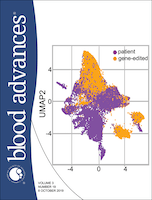
Blood Advances
Scope & Guideline
Shaping the Landscape of Hematology Research
Introduction
Aims and Scopes
- Clinical Hematology:
The journal prioritizes clinical studies that address the diagnosis, treatment, and management of hematologic disorders, including leukemia, lymphoma, myeloma, and bleeding disorders. - Translational Research:
Research that bridges laboratory findings with clinical applications is a core focus, facilitating the development of new therapies and improving existing treatment protocols. - Innovative Therapies:
The journal highlights advancements in novel therapies, including CAR T-cell therapy, gene therapy, and immunotherapy, showcasing their efficacy and safety in various hematologic conditions. - Health Equity and Disparities:
Recent publications emphasize the importance of addressing health disparities in hematologic diseases, focusing on demographic factors such as race, ethnicity, and socioeconomic status. - Patient-Centered Approaches:
Research that explores patient-reported outcomes and quality of life in patients with blood disorders is increasingly emphasized, reflecting a commitment to holistic patient care. - Molecular and Genetic Insights:
The journal publishes studies that investigate the molecular and genetic underpinnings of hematologic diseases, contributing to personalized medicine and targeted therapies.
Trending and Emerging
- CAR T-cell Therapy:
Research on CAR T-cell therapy continues to expand, with numerous studies investigating its efficacy across various hematologic malignancies, reflecting its growing role as a frontline treatment option. - Gene Therapy:
There is an increasing emphasis on gene therapy approaches, particularly for conditions like sickle cell disease and hemophilia, showcasing innovative strategies to correct genetic defects. - Immune Profiling and Biomarkers:
Emerging studies are focusing on immune profiling and the identification of biomarkers for predicting treatment responses and outcomes, which are essential for personalized medicine. - Health Disparities and Access to Care:
Research addressing health disparities, particularly pertaining to access to care and treatment outcomes in diverse populations, is gaining traction, reflecting a broader commitment to health equity. - Longitudinal Patient-Reported Outcomes:
The trend towards incorporating patient-reported outcomes in clinical studies is on the rise, emphasizing the importance of understanding the patient experience and quality of life in hematology. - Utilization of Artificial Intelligence and Machine Learning:
The application of AI and machine learning in hematology research is emerging, particularly in predictive modeling and personalized treatment strategies.
Declining or Waning
- Traditional Chemotherapy Approaches:
As newer therapies such as targeted agents and immunotherapies gain traction, traditional chemotherapy studies are becoming less prominent, suggesting a shift towards more innovative treatment strategies. - Epidemiological Studies:
There has been a noticeable decrease in the number of epidemiological studies exploring the incidence and prevalence of hematologic disorders, possibly due to a growing focus on personalized and targeted therapies. - Basic Science Research:
The journal appears to be publishing fewer basic science studies that do not have immediate clinical implications, as there is a stronger emphasis on translational research that directly impacts patient care. - Longitudinal Studies on Established Treatments:
Fewer studies are being published that focus on long-term outcomes of established treatments, indicating a potential waning interest in revisiting older treatment modalities in favor of exploring novel therapies.
Similar Journals
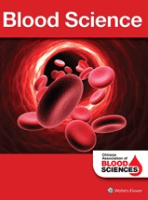
Blood Science
Elevating Knowledge in Hematology and Transfusion MedicineBlood Science is a distinguished peer-reviewed journal published by Lippincott Williams & Wilkins, focusing on the dynamic field of hematology. Since its inception, the journal has aimed to disseminate high-quality research and innovative findings that contribute to our understanding of blood-related health issues. With the ISSN 2543-6368, it offers a platform for academic discussions and breakthroughs in various subfields including hematopathology, blood disorders, and transfusion medicine. As of 2023, Blood Science is ranked in the third quartile (Q3) within the hematology category, indicating a burgeoning influence among its peers, with a Scopus rank of #101 out of 137 journals, placing it in the 26th percentile. Although it is not an open-access journal, it provides essential insights and valuable data for researchers, healthcare professionals, and students alike, enhancing the collective knowledge and practices in hematology. With a publication period spanning from 2019 to 2024, Blood Science remains committed to fostering the advancement of blood science research and enhancing patient care methodologies.
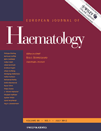
EUROPEAN JOURNAL OF HAEMATOLOGY
Transforming Hematology Through Rigorous ResearchEUROPEAN JOURNAL OF HAEMATOLOGY, published by Wiley, serves as a vital resource for experts in the field of hematology, focusing on the latest advancements in blood disorders and therapies. With an ISSN of 0902-4441 and an E-ISSN of 1600-0609, this esteemed journal has been disseminating knowledge since 1986 and continues to thrive, converging its visionary approach through to 2024. Notably, it holds a distinguished Q2 ranking in Hematology and an impressive Q1 ranking in the broader category of Medicine (miscellaneous) as of 2023, highlighting its significant contribution to the scientific community. With a Scopus rank of #45/137 and a 67th percentile in the field, the journal is recognized for its rigorous peer-reviewed research, making it an indispensable publication for researchers, practitioners, and students aiming to stay at the forefront of hematological studies. Though not an open-access journal, it ensures broad accessibility to critical findings via its subscription model, thus fostering an informed and globally engaged audience.
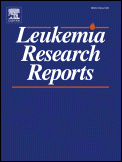
Leukemia Research Reports
Innovating solutions for leukemia challenges.Leukemia Research Reports, published by Elsevier Advanced Technology, is a prominent open-access journal dedicated to the latest advancements in the field of hematology and oncology. Since its launch in 2012, this journal has been a vital resource for researchers, healthcare professionals, and students aiming to disseminate and access high-quality research articles focused on various aspects of leukemia and related blood disorders. With an impact factor indicative of its significance in the field, Leukemia Research Reports currently holds a Q3 quartile ranking in both Hematology and Oncology, and is included in key databases such as Scopus. The journal not only embraces a commitment to open access, ensuring that research is freely available, but also actively promotes collaborations that strive to enhance our understanding and treatment of leukemia. Based in the United Kingdom, this journal continues to play a crucial role in fostering innovation and knowledge sharing within the medical community.
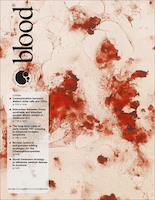
BLOOD
Pioneering Research at the Heart of Hematology.BLOOD, published by the American Society of Hematology, is a premier peer-reviewed journal in the fields of Biochemistry, Cell Biology, Hematology, and Immunology. With an impressive impact factor and ranking in the top quartiles (Q1) across multiple disciplines, BLOOD is essential reading for researchers and professionals seeking to stay updated on the latest advancements in hematology and related fields. The journal has been a cornerstone of hematological research since its inception in 1946, providing a platform for rigorous scientific inquiry and discourse. Its commitment to publishing high-quality original research, comprehensive reviews, and insightful editorials makes it a vital resource for students, practitioners, and scientists alike. By offering exceptional access to influential publications, BLOOD continues to shape the future of hematology and enhance understanding of blood-related disorders, marking its vital role in advancing both basic and clinical research.

INTERNATIONAL JOURNAL OF HEMATOLOGY
Connecting Scholars in the Pursuit of Blood KnowledgeThe INTERNATIONAL JOURNAL OF HEMATOLOGY, published by SPRINGER JAPAN KK, serves as a critical platform for advancing research in the field of hematology. With a prestigious history spanning over three decades from 1991 to 2024, this journal is recognized for its impactful contributions, evidenced by its Q2 category ranking in Hematology for 2023, and its notable position at rank #71 out of 137 in the Scopus Medicine Hematology category. Researchers and professionals within the hematology community benefit from the journal's rigorous peer-reviewed articles that cover a wide range of topics, including clinical studies, basic research, and novel therapeutic strategies. Though currently non-open access, it provides essential insights and findings to an audience passionate about the latest advancements in blood disorders and treatments. Situated in Japan, the journal not only showcases high-quality research but also fosters a global exchange of knowledge in hematology, making it a significant resource for scholars, practitioners, and students alike.
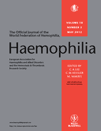
HAEMOPHILIA
Pioneering insights in hematology and genetics.HAEMOPHILIA is a leading peer-reviewed journal published by Wiley, dedicated to advancing research and clinical practices in the fields of hematology and genetics. With an impressive Impact Factor and recognition within the Q1 category for Genetics (clinical), Hematology, and Medicine (miscellaneous), this journal presents a unique platform for the dissemination of high-quality research from 1995 to the present. Researchers in these dynamic fields will find invaluable insights through original articles, systematic reviews, and clinical trials, all aimed at improving therapeutic strategies and patient outcomes. Although it operates on a subscription basis, HAEMOPHILIA's commitment to excellence is reflected in its Scopus rankings, where it stands in the 74th percentile for hematology and the 71st percentile for clinical genetics. As an essential resource for academics, healthcare professionals, and students, HAEMOPHILIA plays a pivotal role in fostering innovation and collaboration within the global medical community.
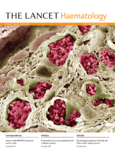
Lancet Haematology
Transforming the future of hematology, one study at a time.Lancet Haematology, published by Elsevier Science Ltd in the United Kingdom, is a premier peer-reviewed journal dedicated to advancing the field of hematology. With an impressive impact factor and listed in the Q1 category in hematology for 2023, this journal ranks #4 out of 137 in the Scopus database, boasting a 97th percentile indicating its influential role in disseminating high-quality research. Since its establishment in 2014, Lancet Haematology has provided a vital platform for researchers and clinicians to share groundbreaking studies, innovative treatment approaches, and novel therapeutic discoveries relevant to various hematological disorders. The journal does not operate under an open access model, but it offers multiple access options to facilitate engagement with its content. By bridging clinical practice and cutting-edge research, Lancet Haematology aims to foster the advancement of knowledge and improve patient outcomes in hematology, making it an essential read for professionals, researchers, and students alike.
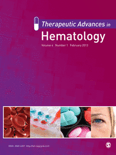
Therapeutic Advances in Hematology
Fostering collaboration for a healthier tomorrow.Therapeutic Advances in Hematology is a prestigious, peer-reviewed journal dedicated to advancing the field of hematology through innovative research and clinical studies. Published by SAGE Publications Ltd, this journal has become a vital resource for hematology professionals and researchers since its inception in 2010. With its impactful Q1 ranking in Hematology and a Scopus rank of 62 out of 137, it firmly establishes itself as a leader in disseminating significant findings and therapeutic approaches. The journal has been committed to open access since 2019, ensuring that its cutting-edge research is readily available to the global scientific community. Covering a broad scope of topics within hematology, Therapeutic Advances in Hematology is an essential platform for those seeking to enhance their understanding and implementation of therapeutic practices in hematological conditions. The journal embraces submissions from both clinical and laboratory perspectives, fostering collaboration and dialogue among researchers, clinicians, and students alike.
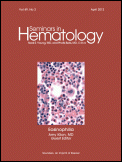
SEMINARS IN HEMATOLOGY
Shaping the Future of Blood Health Through Scholarly Discourse.SEMINARS IN HEMATOLOGY, published by W B SAUNDERS CO-ELSEVIER INC, stands as a premier academic journal dedicated to the field of hematology. Established in 1964, this journal has built a robust reputation over its nearly six-decade history, now recognized as a Q1 journal in Hematology with an impressive impact factor reflective of its high relevance and citation frequency within the academic community. Residents and scholars can access meticulously curated articles that address innovative research, clinical practices, and advancements in the understanding of blood disorders and treatment methodologies. The journal, ranked #36 out of 137 in the Scopus Medicine Hematology category, showcases cutting-edge research, ensuring its contributions are crucial for professionals, researchers, and students striving to stay at the forefront of the hematology field. Although not an Open Access journal, SEMINARS IN HEMATOLOGY continues to unite a global audience dedicated to advancing the science and clinical practices in hematology.
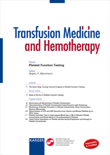
TRANSFUSION MEDICINE AND HEMOTHERAPY
Enhancing global health with impactful transfusion studies.TRANSFUSION MEDICINE AND HEMOTHERAPY, published by KARGER, is a prominent journal dedicated to advancing the fields of hematology and transfusion medicine. With an ISSN of 1660-3796 and E-ISSN 1660-3818, this esteemed journal has been a valuable resource for researchers and clinicians since its inception in 1973, with significant publication phases continuing into 2024. It currently holds a Q2 ranking in Hematology and a Q3 ranking in Immunology and Allergy, reflecting its impact and relevance in these critical fields. The journal features original articles, reviews, and clinical studies, presenting cutting-edge research that aids in the development of effective therapies and enhances patient care. Open access options are available, ensuring that crucial findings are accessible to a broad audience. As an important platform for dialogue and advancement in transfusion science, TRANSFUSION MEDICINE AND HEMOTHERAPY supports the global health community's efforts to improve treatment outcomes and foster innovation in medical practices.